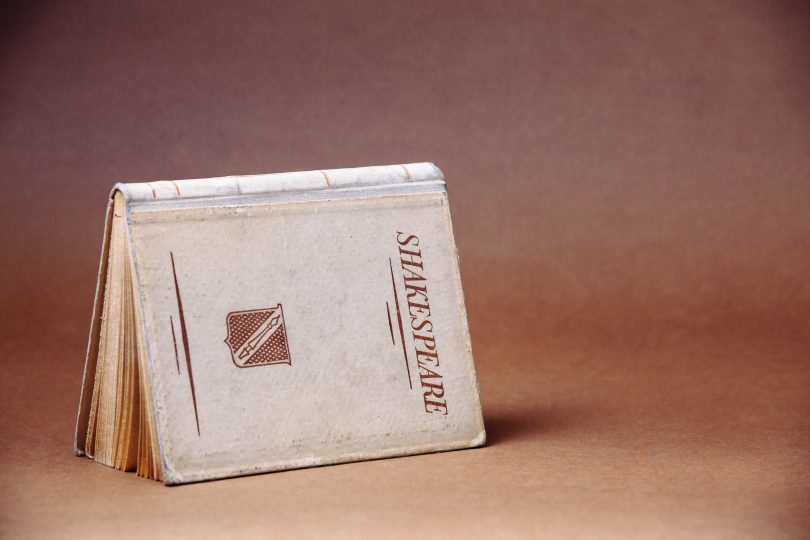It’s long been known that cannabis and creativity go hand in hand: Hendrix, the Beatles and even Carl Sagan, the world famous cosmologist, all used Cannabis’ creative powers. But there is one name to add to that list that may surprise many people and that’s UK nation’s poet, world famous playwright and every school child’s nightmare: William Shakespeare.
In 2001, a South African Anthropologist called Francis Thackeray was given permission from Shakespeare’s birthplace to analyze a collection of pipe fragments found in the grounds of Shakespeare’s garden. The study found that on eight of the pipes there was the residue of cannabis and these were the pipes most closely associated with the Bard’s property itself. It seems that Shakespeare operated on a work hard, play bard routine, perhaps even using cannabis as a stimulant for his creativity. But what evidence is there from the Bard’s own words that he liked to use cannabis and how does cannabis increases creativity in general? In this article, we’ll examine how Shakespeare’s timeline crosses neatly with the large scale introduction of Cannabis plants to the United Kingdom, we’ll look at Thackeray’s study in depth and we’ll investigate the science behind Cannabis and creativity, all to examine if the man ‘of all time’ may have been high whilst writing his finest works.
Cannabis has been known to boost creativity for centuries. Some of our greatest artists throughout history were using cannabis and other psychedelics to reach new heightened new levels of connectivity. To learn more about these compounds, and for exclusive deals on Delta 8, Delta 10 THC, THCV, THC-O, THCP, HHC and even on legal Delta-9 THC, make sure to subscribe to The Delta 8 Weekly Newsletter, your top source for all things cannabis related!
Cannabis and Shakespeare’s England
Before Cannabis was known and used as a recreational drug in Britain it was grown mostly as hemp, a crop used for medicinal reasons and to make fibre, clothes and rope. The earliest known usage of hemp seeds comes from Roman Britain as seeds were found in a well in York. Hemp was also used throughout Anglo-Saxon England as an important crop for the production of medicine, textiles and animal feed. Hemp very quickly became one of the most popular crops in Britain because of its many uses and indeed boomed in Elizabethan England, the time Shakespeare began to write.
Queen Elizabeth I even created a new law that meant every farmer with more than 60 acres of land had to grow hemp. The penalty of not carrying this out was a fine of 5 whole pounds (worth a lot more then than it is now). The medicinal properties of Cannabis were noted by many writers around Shakespeare’s era, John Gerard describes how many ailments Cannabis can cure in his book The Herball (1597). In a book titled ‘The Anatomy of Melancholy’ by Robert Burton, hemp seeds made into a drink are offered as a treatment of depression.
But what about the recreational use of cannabis? Cannabis was being smoked recreationally around the world in the form of Hashish, particularly in the Middle East and Asia, but it’s not easy to find evidence of its use in Britain. However, It is not hard to imagine that travelers from these areas of the world would have found themselves in London pubs or theatres and shown the locals that cannabis plants could be used for more than making ropes or curing ailments.
The Thackeray Study
To make the claim that Shakespeare was using cannabis to help him write, we first need evidence that he was actually smoking it. Francis Thackeray’s study does just this, but beyond Shakespeare it also shows us that Cannabis was being smoked in this era and most likely for recreational reasons. In The study, nicely described in an independent article written by Thackeray himself, the team used state-of-the-art forensic technology to chemically analyse residue found on the pipe fragments. Interestingly, Cannabis was not the only chemical found. Coca leaves, the predecessor of cocaine, were also found on two of the pipes. This is also in line with the fact that many variations of new smokable leaves were brought back from ‘the new world’ by sailors such as Walter Raleigh (Including Tobacco).
To make matters even more interesting, the pipes with Coca residue were the only pipes analysed not from Shakespeare’s garden, but near to it. Instead, the pipes from his garden contained the cannabis residue mentioned earlier. Thackeray even goes as far as to say that “Shakespeare may have been aware of the deleterious (damaging) effects of cocaine as a strange compound. Possibly, he preferred cannabis as a weed of mind stimulating properties.” That says it all. Shakespeare’s choice drug was cannabis, because it boosted his creativity. The Bard of Avon was ahead of his times in many ways.
There are of course some issues with the study and some aspects have to be taken with a pinch of tobacco. Though the pipes were found in Shakespeare’s garden, it’s rather tricky to tie them directly to The Bard himself. Even when dating the pipes, the study can only say that the pipes date to ‘the early 17th Century’, this is quite a broad time-frame, especially considering Shakespeare died in 1616. So we have to be a tiny bit cautious when using Thackeray’s study, but it is very interesting.
The ‘Noted weed’: Shakespeare’s References to Cannabis
Is there any evidence from the man himself about his preference for Cannabis, do we find any enlightenment from flicking through the folio? Amazingly we do, Shakespeare seems to make multiple references to what could be his ‘other muse’. In the Merry Wives of Windsor, the character Ford tells the audience that he wants to drink “pipe wine”, a line usually linked with tobacco, but with the knowledge of Thackeray’s study and the quotes to follow, it could be referencing smoking a different leaf altogether.
In Sonnet 76 we find arguably the most clear evidence of Shakespeare’s use of Cannabis for creativity:
Why is my verse so barren of new pride,
So far from variation or quick change?
Why with the time do I not glance aside
To new-found methods and to compounds strange?
Why write I still all one, ever the same,
And keep invention in a noted weed,
That every word doth almost tell my name,
Showing their birth and where they did proceed?
We see here Shakespeare’s reference his ‘noted weed’, which some (including Thackeray) have taken to be a nod to cannabis being used as a method to help with his writing, or ‘invention’. It seems from this poem that Shakespeare indeed keeps his invention in his weed (cannabis) and uses it whenever he strives to find the right words, or even uses it to show him his character’s histories, fleshing them out (showing their birth and where they did proceed). Earlier in this poem he describes how he doesn’t want to be linked to any ‘compounds strange,’ which Thackeray has taken to mean strange new drugs, even cocaine. More evidence of Shakespeare’s preference to the more natural and ancient method of finding his buzz.
In sonnet 118 Shakespeare says :
Like as, to make our appetites more keen,
With eager compounds we our palate urge
Perhaps a reference again using compounds or drugs to help increase the appetite, both a reference to appetite of life but perhaps also his attitude to writing.
A potentially even more cryptic, but fascinating reference occurs in Henry V where Pistol tries to save a man doomed to hanging he exclaims: ‘Let man go free and let not hemp his windpipe suffocate’. This line has been analysed as potentially having a double meaning. As we’ve discussed above Hemp was used to make fibres and ropes, so Pistol is referring to the rope of the noose, but it could also be a wry nod to the burning feeling cannabis gives the throat.
Shakespeare, Cannabis and Creativity
It’s clear that Shakespeare would at least have come into contact with the use of Cannabis recreationally, and indeed he may have even shown his readers that he liked to use it for inspiration, but what is the science behind cannabis’s link to creativity and how might we use this to further understand why Shakespeare may have relied on it to come up with his most complicated plots.
To understand, we must look at the neuroscience: Cannabis smoking produces a wealth of Dopamine in the brain, including an area known as the frontal cortex. In a study by Schaffer et al in 2011, they took two groups of participants, some with high and some with low levels of creativity and tested them in two conditions: High on Cannabis and non-intoxicated. What they found was that the low creativity group increased their verbal fluency to that of the high-creative group. Verbal fluency is a measure of how quickly and creatively a participant can speak. The authors argue that this increase in fluency was because of the increase of dopamine in the prefrontal cortex which may lead to a swifter ability to produce words.
What Schaffer’s study showed was that creativity in verbal fluency could be increased in those with low creativity. This would seem almost too perfect to a playwright with a mental block. Cannabis also increases blood flow to areas of the brain needed for creativity, including the amygdala, an area needed for emotional processing and empathy. This would perfectly help the playwright put himself in Romeo’s shoes whilst writing the balcony scene.
A Summary on Shakespeare and Cannabis
So it seems rather likely that Shakespeare had indeed found inspiration in his ‘Noted weed’. The fragments of pipe show us that people were smoking Cannabis and more than that, it was being smoked in Shakespeare’s garden, the many quotes and references in Shakespeare’s own works and of course the science behind Cannabis’ link to creativity all point towards the Nation’s bard using cannabis as his muse. Without Cannabis, we wouldn’t have had Hendrix, we wouldn’t have had some of the Beatles finest albums and now we can assume we wouldn’t have even had Hamlet. A rather strong case for Cannabis’s powers of productivity.
Thank you for stopping by CBD TESTERS, your hub for all things cannabis-related. To learn more about this incredible plant, and for exclusive deals on flowers, vapes, edibles, and other products, make sure to subscribe to The Delta 8 Weekly Newsletter!







